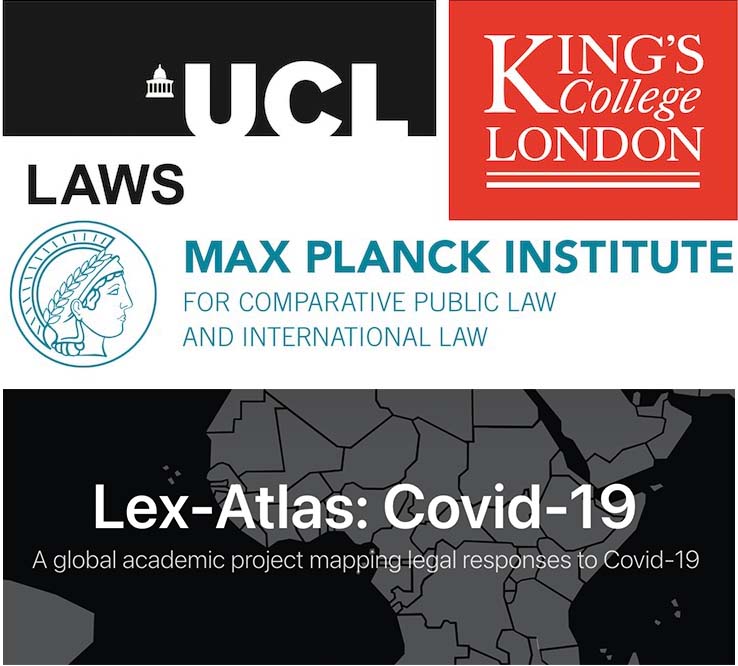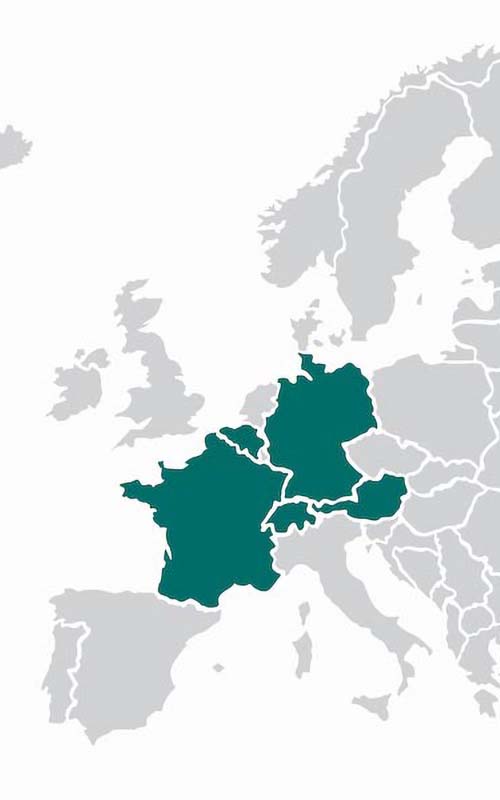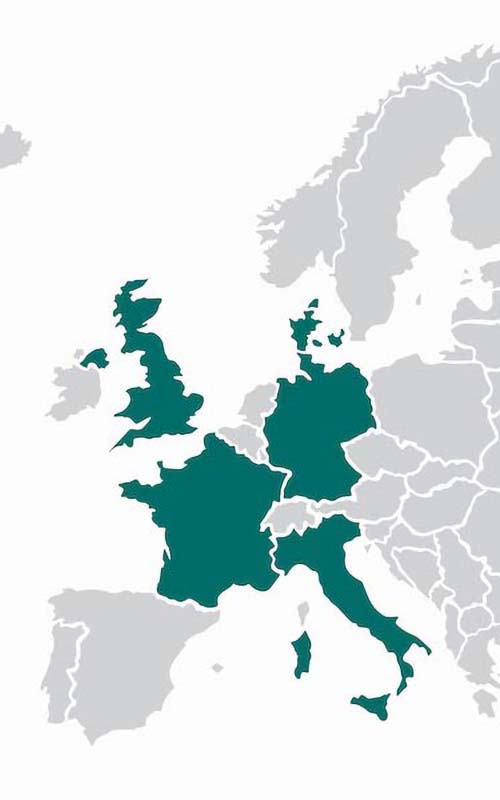1. INTRODUCTION
Impacts

08MIN
The COVID-19 pandemic has thrown the world into a health crisis that has given rise to the need for rapid responses from both scientists and policy makers. But what is the role of law in such a global pandemic and what can jurists contribute? This is a question that is not only important for researchers across Max Planck Law, but jurists everywhere.
In an article published in Kritische Justiz entitled Rechtliches Wissen in der Krise (Legal Knowledge in the Crisis), Ralf Michaels (Director) notes certain challenges for legal researchers, including how the speed and global nature of the pandemic renders traditional legal responses problematic, whether juristic assessments can in any case fully lead to right answers as to what it to be done, the shear complexity of the crisis requiring multidisciplinarity, as well as the problem of epistemic and normative uncertainty.
Michaels therefore warns against legal hubris and calls for a self-conscious understanding of law’s limits in dealing with the crisis. With this caveat in mind, he goes on to suggest the types of legal knowledge that can help in the crisis. One way relates to the ‘rule of law’, e.g. awareness of possible state erosion of fundamental rights and the guarding against authoritarianism through adherence to constitutional principles. Other ways include lawyers’ technical knowledge that enables the implementation of legal measures as well as lawyers’ knowledge of the processes of rational decision-making.

Such applications of law to the crisis can be seen in the voluminous research published both within and beyond Max Planck Law. What perhaps distinguishes Max Planck Law has been and continues to be an emphasis on comparative approaches. To illustrate this, below are a set of examples that, it should be underlined, constitute a mere glimpse of a much larger body of research.
1. COMPARATIVE APPROACHES
The work of Stefan Vogenauer (Director) on contract law in a historical and comparative perspective has long focused on how contract laws react to unforeseen changes in circumstances which occur after the conclusion of a contract and unsettle the contractual equilibrium. What happens, for example, if a contracting party cannot perform because its factory has to close down during a pandemic? What happens if performance becomes much more onerous for a party because market conditions change dramatically and the price for, say, protective equipment skyrockets? Different contract laws employ various doctrines to deal with such scenarios: ‘force majeure’, ‘hardship’, ‘collapse of the basis of the transaction’, ‘frustration of contracts’ etc.

A comparative overview of how the most important European legal systems tackle these issues can be found in Cases, Materials and Text on Contract Law (3rd Edn) Chps 28–30, a volume in the Ius Commune Casebooks for the Common Law of Europe series. Vogenauer is also co-editing volume V of the Studies on the Contract Laws of Asia series, on Ending and Changing Contracts, published with Oxford University Press. This will cover fourteen jurisdictions from East Asia, South East Asia and South Asia, many of which have valuable recent experiences of previous pandemics, such as SARS and H1N1 influenza (‘swine flu’).
__________
Sometimes the best way to do comparative research is to pool resources and collaborate. A perfect example is ‘Lex-Atlas: COVID-19′, a joint project between University College London, King’s College London, and . The project aims at in-depth qualitative reports of legal measures adopted by sixty countries, representing all regions in the world, in response to the COVID-19 pandemic. The output offers valuable nuances resulting from a careful scrutiny of comparative public law. Measures which, at first sight, appear to be the same, actually have diverging features and consequences depending on the legal system at stake.

The project’s main output, the Oxford Compendium of National Legal Responses to COVID-19, has already been published online. The compendium is the result of the joint efforts of a large editorial team, of which Pedro A. Villarreal (Senior Researcher) is a member. He conducts editorial review of issues of international and comparative health law and is also the country rapporteur for Mexico.
The project is not only of use to legal scholars and practitioners, but also to wider medical and public health community. Public law provides for the distribution of powers in healthcare services and emergencies, defines the exact type of legal acts mandating health measures, and shapes their implementation and enforcement. These are all central determinants of the effectiveness of national strategies against COVID-19. Therefore, comparative public law inquiries allow for key understandings on how to adjust pandemic strategies to diverging contexts. The Oxford Compendium shows why law is a necessary component of any adjustment process.
__________
More comparative research can be seen in a working paper entitled “Vaccination Policies in Europe: A Comparative Study Between Selected Countries” published by researchers at , led by Alessandra Donati (Senior Researcher). The reserach involved an analysis of vaccine policies in France, Germany, Belgium, Austria, and Switzerland. Questions included decisions at the national level on a series of vaccine-related issues, for example, whether there are existing standards on compulsory vaccination; which entities have the power to impose compulsory vaccination; which instruments (law, regulations, or decrees) are used to deal with vaccination; whether there are policy instruments used to incentive pro-vaccination behaviour. The short timespan in which the paper was produced gives the publication a cutting-edge dimension and serves as guidance to policy makers. However, the authors acknowledge that the dynamic nature of events do not allow for making definitive assessments.

___________
Another working paper, ‘Protecting Livelihoods in the COVID-19 Crisis: Legal Comparison of Measures to Maintain Employment, the Economy and Social Protection, was published by Ulrich Becker (Director) in collaboration with other researchers at his Institute. It investigates the crucial role played by the welfare state in the Covid-19 crisis. Focusing on measures implemented in Denmark, France, Germany, Italy, and the United Kingdom between March and October 2020, the investigation covered not only measures aimed at maintaining the overall economy, such as tax relief and aid, but also mechanisms to secure jobs and wages as well as a variety of targeted social benefits or instruments to facilitate access to social protection. Against the background of the different institutional frameworks in those countries, the study aimed at showing how the implemented mechanism related to existing social protection regimes, and what changes they lead to in existing social protection.

Taking a comparative approach, the working paper shows that while being in a ‘crisis mode’ all countries responded to the emergency by means of exceptional state interventions. On the one hand, legislative procedures were accelerated and the possibilities of executive legislation were expanded. On the other hand, a combination of different approaches was used in all countries, including for instance cash benefits, tax breaks, and deferral of social security contributions. Nonetheless, most instruments were designed to last only until the end of the crisis and were therefore introduced on a temporary basis. The authors intend to revisit the results of the study once a ‘new normality’ has taken shape.
_________
Max Planck Law
Max Planck Law Initiatives and Projects are bottom-up collaborations between researchers at different Institutes within the Max Planck law network. Of interest here is a Max Planck Law Project led by Pedro A. Villarreal (Senior Researcher) and Irene Domenici (Researcher) entitled ‘Fragmented Nature of Pandemic Decision-making: Comparative and Multilevel Legal Analysis’.
The unfolding of the COVID-19 pandemic sheds light on the role that multiple legal instruments play during such events, whether at the international, regional-European, or national levels. Countries the world over have been confronted with the pandemic’s impact in all aspects of their societies and they face the challenge of responding within the framework of their respective legal systems. While the need for international coordination has only increased, a variety of legal issues have also arisen in national settings. It is against this background that this project aims at assuming a simultaneously comparative and multilevel perspective to evaluate the different layers of pandemic decision-making.
The outcomes of this project are due to be published in a peer-reviewed journal and will be of use to policy makers in understanding the role of law in determining pandemic responses, thus putting us in a better position to deal with future pandemics.
3. QUESTIONS OF PRINCIPLE AND JUSTICE
Moving away from examples of comparative legal research, we turn now to research across Max Planck Law that illustrates the importance of thinking and applying legal principles in a pandemic crisis.
For example, what legal stakes are involved when there is political pressure to more strictly control and even close borders to prevent the spread of COVID-19 but in a region that legally guarantees free movement? Luc Leboeuf (Head of Research Group) considers this in an article published in Revue Des Affaires Européenes. He specifically looks at the dynamics between the EU Institutions and the Member States when controls were increased at the EU’s internal borders as result of COVID-19. His contribution takes stock of the developments at EU level, analyzing how the EU institutions sought to preserve the Schengen area’s integrity through non-binding guidelines. He concludes by highlighting a tension between, on the one hand, Member States who wish to keep a margin of appreciation when introducing border controls, and on the other hand, the European institutions who seek to balance this with the principles of proportionality and solidarity.
__________
Another crucial area requiring a focus on legal principle are the ramifications for doctors deciding levels of priority in treating critically ill COVID-19 patients. In the introductory chapter to Triage in der Pandemie [Triage in the Pandemic], the editors Tatjana Hörnle (Director) and Ralf Poscher (Director), together with Stefan Huster (Ruhr-Universität Bochum), argue that such tragic choices should not be left entirely to a single doctor. It is therefore necessary to establish common rules on applicable prioritization criteria and procedural requirements. Moreover, one should take into consideration a collective interest in an efficient and fair distribution of resources. At stake is the society’s trust in the healthcare system.
Poscher’s contribution analyzes the implications of the State’s obligation to guarantee human dignity on the possible regulation of triage situations. He argues that a deep investigation of these implications brings about a better understanding of the human dignity requirement and of its relationship with the right to life. Although the prohibition on valuing one life over another is well established, such balancing becomes necessary in cases of triage. In such tragic situations, the balancing of two lives does not always directly entail an infringement of the guaranty of human dignity. Poscher concludes that the human dignity requirement does not prevent the State from establishing triage criteria.

In her contribution, Hörnle focuses on possible criminal consequences of ‘ex-post triage’, namely the interruption of the treatment of a patient in critical condition due to the arrival of another patient with better chances of survival. She argues that, in the current framework, this behaviour could be of criminal relevance and lead to a conviction. This prognosis is nonetheless unclear and disputed, thus creating a situation of great uncertainty. The author suggests, therefore, that ex-post triage should be instead handled according to the normative standards applicable to ex-ante triage and that justification should therefore lie in the conflict of duties rather than in the situation of emergency.
__________

In response to this, Reto M. Hilty (Director) together with other researchers at his Institute published in May 2021 a ‘Position Statement‘ in which they argue that suspension of intellectual property rights would neither foster vaccine production nor lead to a more equitable distribution of vaccines. On the contrary ‘IP rights might so far have played an enabling and facilitating rather than hindering role in overcoming COVID-19 …’. (p. 1).
The position statement is structured as ten points with associated lines of fully referenced argumentation. If waiving intellectual property rights is not the answer, their final point answers what is needed to ensure fair access to vaccines, namely global solidarity entailing the need for global governance which in turn ‘requires safety, transparency, accountability and legal compliance control …’. (p. 7)
__________
Last but not least, do individuals and businesses have to bear their own corona-related losses? Can those directly affected pass on these financial burdens to their private contractual partners? And is it reasonable to ask taxpayers as a whole to pay for the disadvantages incurred? These are the critical questions address by Wolfgang Schön (Director) in a September 2020 article in the Frankfurter Allgemeine Zeitung entitled Wer zahlt für Corona? [Who Pays for Corona?].

By posing these questions, the author shows us that, despite all the measures implemented by the state and the fact that Germany has so far succeeded in saving the overall economy, the question of fair allocation of Corona risks in the community remains open. Adopting an approach based on the differentiation between contractual justice and distributive justice, he analyses several scenarios in which risks and losses directly caused by the pandemics are allocated to different subjects according to the chosen concept of justice. In fact, both concepts of justice can provide answers to the financial challenges of the Corona crisis, but they take quite different factors into account. In doing so, Schön demonstrates how almost every corona-related claim can be assessed in this alternative between individual contractual and collective justice.